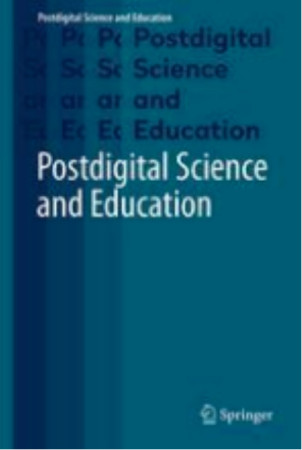Postdigital Gaming - call for book chapters

Category: Publication
The notion that digital games have the capacity to support learning has long captured the imagination of educators, industry, and the public. As digital technologies have advanced, so has the sophistication of digital games, leading to more ambitious claims about their potential to fundamentally challenge traditional approaches to education, and assertions about their social and cultural role in contemporary society. However, ideas emanating from postdigital studies offer new conceptual tools for rethinking tech-human relations and questioning simplistic narratives and assumptions surrounding digital technologies (Jandrić and Knox 2022). The postdigital rejects the notion of a clear divide between the digital and non-digital realms, recognizing that technology is deeply entangled with social, cultural, and material contexts (Fawns 2022). It acknowledges the continuities and histories that shape our relationship with technology (Knox 2019), rather than viewing it as a disruptive force that operates independently from human experiences. Efforts to expand how we think about digital media—in terms of interconnected network imaginaries (Jagoda 2016) or massive and dynamic interrelations of processes, objects, beings, and things (Fuller 2005)—have created opportunities to revisit how we understand digital games and their relationship to learning and education. For example, Apperley (2010) uses the concept of digital game ecologies to argue for contextually dynamic, ecological, and situated understandings of digital games. Other more recent work employs postdigital concepts to examine relationships between digital games, learning, literacy, and education (Bacalja 2024; Bacalja et al. 2024). Whether conceptualised in terms of digital games, videogames, gaming, or even game literacies, we agree with James Gee’s (2024) recent declaration: we need to focus less on the little g games (the software), and more on the big G games (social and institutional actions that surround the software). This book aims to achieve two main tasks: to expand approaches to conceptualising digital games and gaming in light of our postdigital condition, and to interrogate assumptions about the relationship between digital games, learning, and education. We welcome shorter conceptual chapters (up to 3500 words) as well as longer empirical chapters (up to 7000 words). We also encourage graduate students and early career academics to submit. Contributions may include following topics: ● Postdigital game ecologies and their entanglements. ● Critical inquiries into games and gaming. ● Games as research methodologies and objects of study. ● The interplay between games and education. ● Games as contexts and models for learning. ● Language and literacy practices in and around games. ● Gaming beyond digital/analog binaries (e.g., board games). ● Hybrid and transmedia gaming experiences. ● Platformatization of gaming and gaming culture. ● Games, EdTech, and the education industry. ● Techno-financial futuring in gaming. ● Economic and political actors and narratives.
Initiator(s):
Alexander Bacalja
,
Bradley Robinson
,
Gideon Dishon
Deadline: 15.02.2025
Publication-Type: Book
https://drive.google.com/file/d/1x4N3PkDIQB52QhvgDsYZNtAtNNIyRpSN/view
Post created by: Lymor Wolf Goldstein